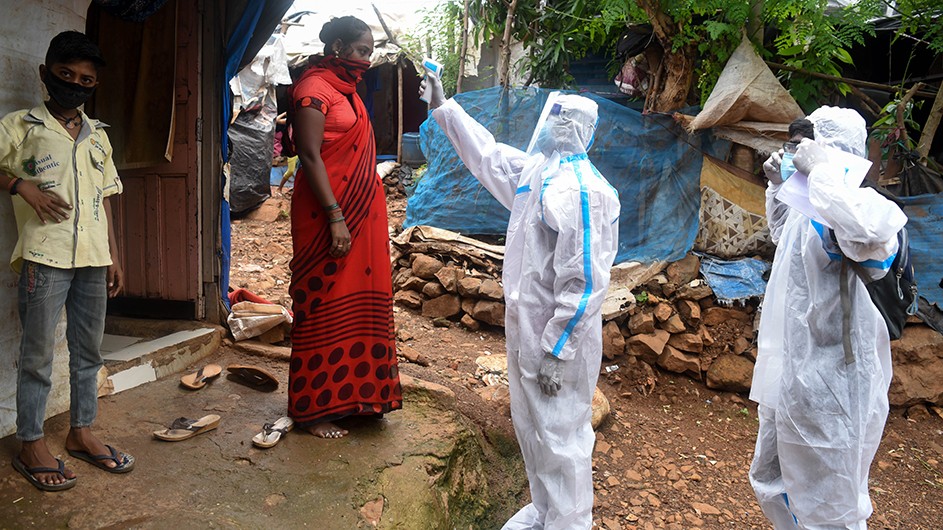COVID-19 and the Economic Agenda
NOBEL LAUREATES, 29 Mar 2021
Joseph E. Stiglitz, Nobel Economics Laureate | Columbia News – TRANSCEND Media Service
What advanced countries can and should do to help the developing world and emerging markets recover from the pandemic and its economic aftermath.

A woman in Mumbai has her temperature checked as part of efforts in India to combat the spread of COVID-19.
25 Mar 2021 – While we celebrate the United States’ emergence from the pandemic and the quick and robust economic recovery, thanks to strong federal support, poorer countries face much dimmer prospects. They don’t have access to COVID-19 vaccines or to the resources to reignite their economies after the global slowdown. Many are further burdened by levels of debt that were barely manageable before the pandemic, but are crushing them now.
First Contain the Disease
The Institute for New Economic Thinking’s Commission on Global Economic Transformation, which I co-chair, has just issued a report on how to achieve a quick global recovery both from the pandemic and its economic aftermath—what can and should be done by advanced countries to help the developing world and emerging markets. Until the disease is contained everywhere and all economies get back on track, the world won’t recover fully either from the pandemic or its economic aftermath.
The first challenge is to make vaccines, medicines, tests, and protective gear available everywhere. The report emphasizes that to a large extent the supply constraints are artificial. The real constraint is access to knowledge, which is impossible to obtain because of the distorted system of intellectual property rights. Ironically, the basic research underlying much of this knowledge has been paid for by governments and produced by universities and research institutes. The U.S. and other advanced countries need to support the suspension of intellectual property rights related to COVID-19 and the pooling of such rights, measures that are already being advocated by many countries worldwide.
More Fiscal Room to Operate
Developing countries need to have more fiscal room to operate, and the report describes concrete measures that must be undertaken now to give them that room. The first is a large issuance of Special Drawing Rights (SDR), a kind of global money the IMF can distribute quickly. The SDR’s are issued on a formulaic basis, whether countries need the money or not, so it will be important for the advanced countries to reallocate their SDR’s to the emerging markets and developing countries that are desperately in need of funds.
Just how much they need the money is made clear by the disparity in stimulus spending between rich and poor countries. President Biden made a persuasive case that the country needed an additional $1.9 trillion in a rescue package that brought the total up to some 25% of GDP, or $17,000 per capita. The result is that the Fed is now expecting growth of around 6.5% in 2021, and some analysts see a record growth of 8%. But on average, poorer countries have been able to spend just $2 per capita, one eight-thousandth of what the U.S. is spending. No wonder analysts expect their projected recovery to be anemic.
A Crushing Debt Burden
Making matters worse is the crushing debt burdens a large number of countries are under, including some of the poorest. Money used to service debt is money that is not available for health, education, broader economic development, or just meeting the exigencies of the pandemic. The standstills that were called for by the G-20 at the beginning of the crisis met with recalcitrance from the private sector. And now that the pandemic downturn has lasted longer than anticipated a year ago, poorer countries need a deep, comprehensive and timely debt restructuring. But we shouldn’t expect cooperation from private creditors without some cajoling from governments of the creditor countries.
The report notes certain aspects of the legal structure of the creditor countries that actually incentivizes litigation and foot-dragging—the 9% prejudgment interest rate in New York for example—and identifies concrete actions the creditor jurisdictions could undertake to help create a timely debt restructuring. Without restructurings, many countries may face extended downturns and the global recovery will be weaker than it otherwise would have been.
These steps, addressed in the report, must be taken now for any hope of a quick global recovery.
______________________________________________
 Joseph Eugene Stiglitz is an American economist and a professor at Columbia University. He is a recipient of the Nobel Prize in Economic Sciences (2001) and the John Bates Clark Medal (1979). He is a former senior vice president and chief economist of the World Bank and is known for his critical view of the management of globalization, free-market economists (whom he calls “free market fundamentalists”), and some international institutions like the International Monetary Fund and the World Bank. Stiglitz is the author of The Price of Inequality and most recently of People, Power, and Profits: Progressive Capitalism for an Age of Discontent.
Joseph Eugene Stiglitz is an American economist and a professor at Columbia University. He is a recipient of the Nobel Prize in Economic Sciences (2001) and the John Bates Clark Medal (1979). He is a former senior vice president and chief economist of the World Bank and is known for his critical view of the management of globalization, free-market economists (whom he calls “free market fundamentalists”), and some international institutions like the International Monetary Fund and the World Bank. Stiglitz is the author of The Price of Inequality and most recently of People, Power, and Profits: Progressive Capitalism for an Age of Discontent.
Tags: COVID-19, Cooperation, Coronavirus, Economic Crisis, Economics, Joseph E. Stiglitz, Nobel Economics Prize, Pandemic, World
DISCLAIMER: The statements, views and opinions expressed in pieces republished here are solely those of the authors and do not necessarily represent those of TMS. In accordance with title 17 U.S.C. section 107, this material is distributed without profit to those who have expressed a prior interest in receiving the included information for research and educational purposes. TMS has no affiliation whatsoever with the originator of this article nor is TMS endorsed or sponsored by the originator. “GO TO ORIGINAL” links are provided as a convenience to our readers and allow for verification of authenticity. However, as originating pages are often updated by their originating host sites, the versions posted may not match the versions our readers view when clicking the “GO TO ORIGINAL” links. This site contains copyrighted material the use of which has not always been specifically authorized by the copyright owner. We are making such material available in our efforts to advance understanding of environmental, political, human rights, economic, democracy, scientific, and social justice issues, etc. We believe this constitutes a ‘fair use’ of any such copyrighted material as provided for in section 107 of the US Copyright Law. In accordance with Title 17 U.S.C. Section 107, the material on this site is distributed without profit to those who have expressed a prior interest in receiving the included information for research and educational purposes. For more information go to: http://www.law.cornell.edu/uscode/17/107.shtml. If you wish to use copyrighted material from this site for purposes of your own that go beyond ‘fair use’, you must obtain permission from the copyright owner.